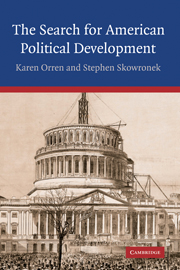3 - The Institutional Turn: Rethinking Order and Change over Time
Published online by Cambridge University Press: 24 May 2010
Summary
… institutions must advance and keep pace with the times. We may as well require a man to wear still the coat that fitted him when a boy as civilized society to remain ever under the regimen of their barbarous ancestors.
Thomas JeffersonThe claim of conservative idealists like burgess, that political institutions express the aspirations of the civilization they serve, gave us one view of political development; the claim of progressive scholars that political institutions reflect economic interests and the balance of power among them offered another; the claim in some recent studies in APD that institutions subvert culturally generated alternatives calls into question the notion of political development itself. What scholars say about political development turns in good measure on how they think about political institutions, and the question of how institutions affect political outcomes currently supports a multifaceted intellectual movement of its own. The claim of the “new institutionalists” is that institutions do not merely express or reflect or deflect elements in their political surroundings. Institutions participate actively in politics: they shape interests and motives, configure social and economic relationships, promote as well as inhibit political change.
For APD scholarship, a “new institutionalism” has several attractions. The more proactive role attributed to institutions in processes of political change is of obvious interest, but an institutional turn has a strong instrumental appeal as well.
- Type
- Chapter
- Information
- The Search for American Political Development , pp. 78 - 119Publisher: Cambridge University PressPrint publication year: 2004
- 1
- Cited by



